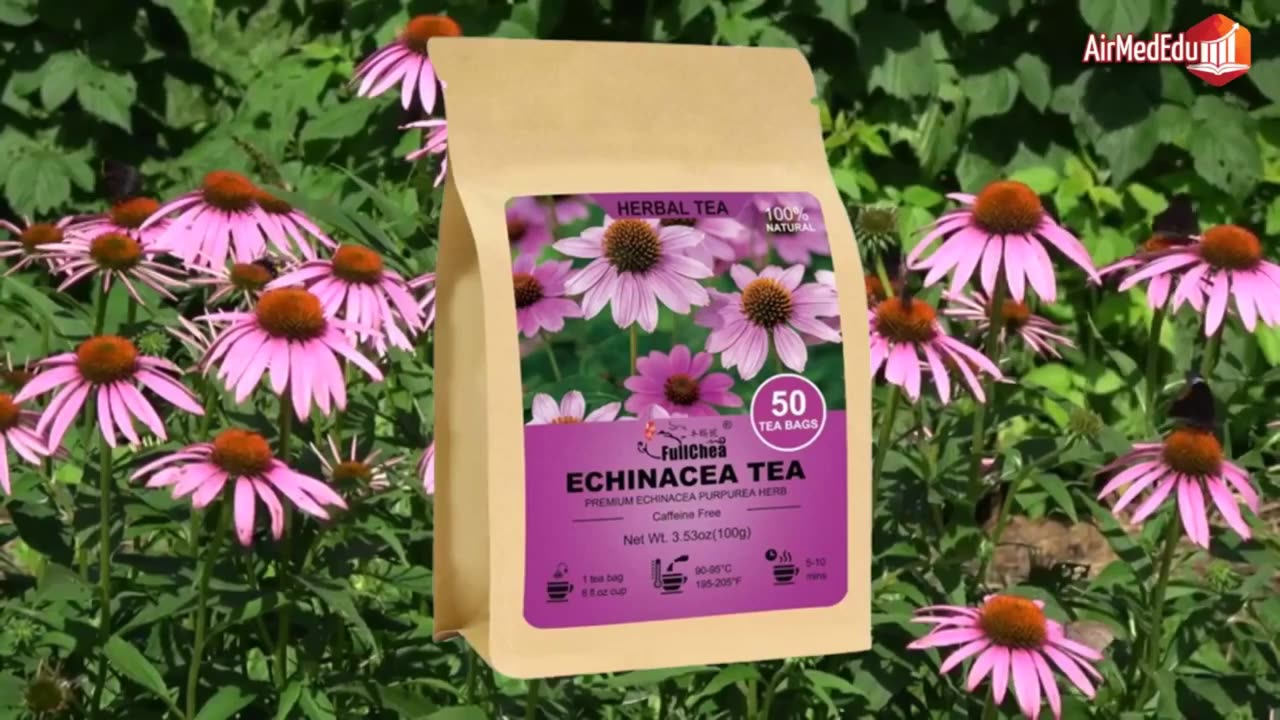Premium Only Content

Effect of Echinacea Tea on the Body
Echinacea tea, derived from a plant native to North America that has been used for centuries by indigenous tribes to treat various ailments, has become popular worldwide as a natural remedy to strengthen the immune system. This herb, scientifically known as Echinacea purpurea or Echinacea angustifolia, among other species, grows in prairies and is characterized by its daisy-like purple flowers. It belongs to the Asteraceae family. Native Americans used it to heal wounds, infections, and snake bites, and with the arrival of European settlers, its use expanded to treat colds and flu. Today, tea is prepared from the plant's roots, leaves, or dried flowers. Its consumption is primarily associated with its properties that help the body fight infections. However, it is always important to remember that it is not a substitute for conventional medical treatments and that its effectiveness varies according to scientific studies.
Within the body, Echinacea acts primarily as an immunomodulator, stimulating the production of key immune system cells such as T lymphocytes, macrophages, and interferon, which are responsible for identifying and destroying pathogens like viruses and bacteria. Its active components, such as alkamides, polysaccharides, glycoproteins, caffeic acid derivatives, rosmarinic acid, and flavonoids, work synergistically to enhance the immune response, reducing the proliferation of invading microorganisms and promoting the release of cytokines, proteins that regulate inflammation and the body's defenses. This action not only strengthens the body's natural barriers, such as hyaluronic acid, which protects connective tissues from bacterial invasion, but also exhibits direct antiviral effects, inhibiting the replication of viruses such as herpes simplex or rhinoviruses that cause the common cold. Furthermore, its anti-inflammatory properties help mitigate excessive immune system responses, which may be useful in conditions where inflammation plays a major role, although more research is needed to fully understand how these mechanisms translate into consistent clinical benefits in humans.
One of the most notable effects of echinacea on the body is its ability to shorten the duration of symptoms of respiratory infections, such as the cold or flu, by rapidly activating innate and adaptive defenses. For example, when consuming the tea at the onset of a cold, some studies have observed that symptoms such as nasal congestion, cough, and sore throat decrease more quickly, thanks to its expectorant and antipyretic action, which reduces fever and facilitates the expulsion of mucus. This plant also counteracts the enzyme hyaluronidase produced by certain bacteria, preserving tissue integrity and preventing the spread of infections. In the digestive system, it stimulates the secretion of saliva and gastric juices, improving digestion in cases of "sluggish stomach" or dry mouth, while its antioxidant effect combats oxidative stress, protecting cells from damage caused by free radicals.
The benefits of echinacea tea are extensive and focus primarily on immune support, making it a popular ally during the cold season. It has been shown to reduce the risk of contracting the common cold by 10 to 20% when taken preventively, especially in people prone to recurrent infections, such as those with weakened immune systems due to stress or fatigue. For respiratory infections such as sinusitis, bronchitis, or pharyngitis, the tea helps relieve symptoms, speeding recovery and reducing the need for antibiotics in mild cases. Furthermore, its antiviral properties make it useful against cold sores or genital herpes, where topical applications combined with oral intake can prevent recurrent outbreaks by inhibiting viral replication before the lesion manifests.
Another notable benefit is its role in skin care and wound healing, as echinacea promotes tissue regeneration and reduces inflammation in conditions such as eczema, minor burns, abscesses, and boils. In studies, it has been shown to be effective in the treatment of atopic dermatitis, restoring the skin barrier and relieving itching. For urinary tract infections such as cystitis or urethritis, it acts as a natural antiseptic, helping to eliminate bacteria and reducing discomfort. Even in chronic conditions such as chronic fatigue syndrome or spring asthenia, the tea can provide an energy boost by improving the overall immune response.
On a mental level, there are indications that echinacea may help reduce anxiety, as some of its compounds, such as alkamides and rosmarinic acid, interact with cannabinoid receptors in the brain, promoting a calming effect similar to that of certain natural therapies, although further studies are needed to confirm this in humans. Furthermore, preliminary laboratory research suggests that it may lower blood sugar levels and slow the proliferation of cancer cells, offering potential as an adjuvant in diabetes or cancer treatments, but these effects have not been sufficiently proven in large clinical trials.
Preparing echinacea tea and obtaining its benefits is simple and can be done at home with natural ingredients. Generally, one teaspoon of dried roots or leaves is used per cup of boiling water; let it steep for 15 minutes, strain it, and drink it warm. This infusion is ideal for relieving flu and cold symptoms, such as cough and runny nose, and is recommended to be consumed twice a day. In specific cases, such as ear infections or styes, two cups a day prepared with one tablespoon of the dried plant per cup may be sufficient, while for digestive problems, the same dose helps stimulate appetite and salivation. As a symptomatic treatment, it is suggested to take it at the onset of symptoms for no more than 10 days, and for prevention, in discontinuous cycles of one or two months with similar breaks, not exceeding 6 to 8 continuous weeks to avoid tolerance or adverse effects.
The recommended dosage varies depending on the form and concentration, but for tea, a daily intake of about 3 grams of dried plant divided into two or three cups is common, always following the manufacturer's instructions or under medical advice. It is important to opt for standardized preparations, available at herbalists or pharmacies, to ensure quality and avoid variations in potency. For prolonged immune support, low doses in tea can be combined with other herbs such as propolis or cat's claw, enhancing the effects without overloading the body.
Despite its benefits, echinacea tea can cause side effects in some people, although they are generally mild and temporary. The most common include nausea, vomiting, stomach pain, diarrhea, and an unpleasant taste in the mouth, possibly due to the alkamides that cause tingling or numbness of the tongue. Other reported reactions include fever, sore throat, muscle or joint pain, dizziness, fatigue, headache, confusion, and insomnia, especially if consumed in excess or for prolonged periods. In rare cases, it can trigger allergic reactions such as itching, hives, rashes, or worsening of asthma attacks, particularly in individuals sensitive to plants from the same family.
To minimize risks, it is essential to take precautions when consuming echinacea tea and avoid complications. Prolonged use beyond eight weeks without interruption is not recommended, as it could lose effectiveness or cause chronic indigestion. People with autoimmune diseases such as rheumatoid arthritis, lupus, psoriasis, or multiple sclerosis should abstain from taking it, as its immunostimulating action could exacerbate symptoms by increasing the activity of antibodies against their own tissues. Similarly, it is contraindicated in patients with tuberculosis, leukemia, HIV/AIDS, collagen diseases, or those on immunosuppressive therapy, as it could interfere with treatments.
Pregnant or breastfeeding women should avoid it, as animal studies suggest a possible risk of miscarriage, and there is insufficient data on its safety in humans during these stages. Children under 12 years of age should not consume it due to the increased risk of severe allergic reactions, such as glottic edema or asthma. Those allergic to plants in the Asteraceae family, such as daisies, chrysanthemums, or sunflowers, may experience hypersensitivity, so it is vital to try small doses initially. In addition, it should be avoided in combination with caffeine, as it can increase its side effects such as nervousness or insomnia, or with medications eliminated through the bile and immunosuppressants, to prevent negative interactions.
In individuals with liver failure or a tendency toward congenital hypersensitivity, consumption should be supervised by a healthcare professional, and it is always advisable to consult a physician before starting any regimen with echinacea tea, especially if you are taking other medications or suffer from a chronic condition. Choosing standardized products from reliable sources minimizes risks, and if adverse symptoms appear, discontinue use immediately and seek medical attention. This way, you can safely enjoy its properties, integrating it as part of a healthy lifestyle that includes a balanced diet, exercise, and adequate rest.
In short, echinacea tea offers a natural approach to supporting immune health, but its responsible use is key to maximizing benefits and avoiding problems. By understanding its action in the body and respecting dosages and precautions, it becomes a valuable tool for daily well-being, always complementing, not replacing, professional medical advice.
-
 LIVE
LIVE
IamNibz
2 days ago $0.08 earnedPansy Umbrellas And Buff Emo Horse- WHERE WINDS MEET! (Ft. Diony)
33 watching -
 53:56
53:56
ZeeeMedia
21 hours agoSilicon Valley, Transhumanists & the Book of Revelation ft. Jay Dyer | Daily Pulse Ep 144
15.8K13 -
 1:02:02
1:02:02
A Cigar Hustlers Podcast Every Day
1 day agoEpisode 4 Hustler Every Day Target 10/4, No More Pennies and Gronk Is The Man
15K1 -
 3:07
3:07
GreenMan Studio
1 day agoHOW TO NOT SELL OUT IN 2025 W/Greeman Reports
13.8K6 -
 0:43
0:43
WildCreatures
2 days ago $3.98 earnedDiver is swallowed up by a passing bait ball at Darwin Island
15.7K4 -
 1:54
1:54
Damon Imani
3 days agoDamon Left The View SPEECHLESS on Marriage And Government Overreach
17.6K10 -
 4:09
4:09
Memology 101
16 hours ago $2.31 earned"Journalist" REPEATEDLY tries and FAILS to bait John Fetterman into calling Trump an "AUTOCRAT"
17.4K26 -
 58:02
58:02
Dialogue works
2 days ago $7.78 earnedMatthew Hoh: Ukraine’s Army Is COLLAPSING Everywhere!
40.2K19 -
 17:24
17:24
Nate The Lawyer
2 days ago $3.46 earnedBREAKING: NEW Scientific Evidence Shows Men Are Better in Sports Than Women
21K18 -
 29:43
29:43
Code Blue Cam
2 days agoHow Missing Dipping Sauce Turned into a Felony Arrest
20.9K17